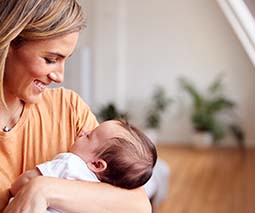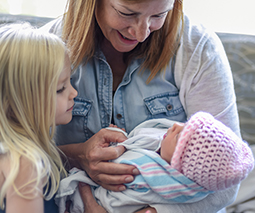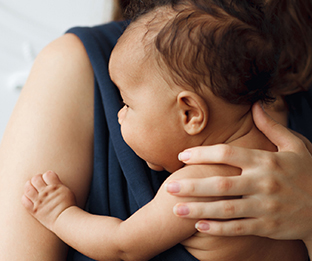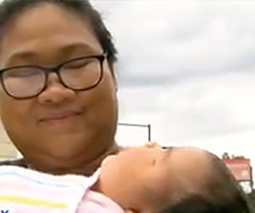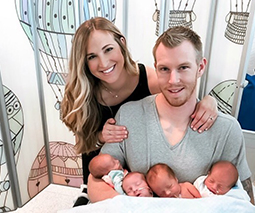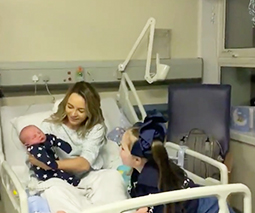Doctors and nurses: Who to trust when it comes to treating your baby?

Most new mothers would agree, having a supportive team rally around you when you first bring baby home makes your new role feel a lot more manageable.
Your tribe is likely to include your partner, parents, siblings, close friends and fellow first-time mothers in your mother’s group. If my experience was anything to go by, they all had lots of advice, but not necessarily medically sound advice. (Incidentally, my husband is a member of the medical fraternity, and his advice was the worst of all!)
That’s where my local health centre’s maternal and child health nurse (MCHN) came to the rescue, as an independent, experienced, and medically trained voice of reason.
My MCHN conducted an initial home visit and checked the cot was set up to be SIDS friendly, measured my infant son’s height, weight and head circumference, and talked through the hundreds of questions I had about caring for him.
She assured me that I was doing a wonderful job, which helped relieve the anxiety I was feeling as a nervous first-time mum.
After that initial home visit, my son’s growth was routinely monitored at the healthcare centre, during the two, four and eight week checkups. I continued to receive advice on his development and reinforcement that I was doing everything right.
A bump in the road …
At my son’s twelve-week checkup, my MCHN instructed me to strip him off and place him gently on the scales. Carefully checking him over and taking his measurements, she suddenly frowned and pointed to a tiny lump in his groin area.
“I’m afraid it looks like he has an inguinal hernia,” she said. “He’ll need immediate surgery for that. Take him straight to your GP now as I’m unable to officially diagnose him, but you’d better get a bag packed as you’ll be in the Children’s Hospital overnight.”
I was dumbfounded. Up until now my baby had been the picture of health, feeding like a champ and steadily gaining weight. How had everyone, including his paediatrician, failed to notice he had a hernia?
I later learned that three to five per cent of healthy, full-term babies may be born with an inguinal hernia. In boys, the testes are initially located in the abdomen, and in the seventh month of pregnancy, descend down into the scrotum through the inguinal canal.
The canal begins to fuse before birth and is normally completely closed by the end of the first year of life. In some cases though, the canal does not close completely, with the muscles in the wall of the abdomen failing to cover the opening sufficiently, resulting in a hernia.
I managed to calmly call my GP to make an immediate appointment, rushed home to pack an overnight bag and called my husband.
As the GP examined my little boy, I braced myself for the diagnosis and instructions to head straight to the Children’s Emergency Department.
“What makes you think your baby has an inguinal hernia?” the doctor asked.
“Looks like a simple cyst to me. We’ll send him for an ultrasound just for peace of mind, but he certainly won’t require surgery.”
Suffice to say, my son was fine. He had a hydrocele – a very common fluid-filled sac that is likely to correct itself before he is 12 months old.
Was this a unique experience?
After relaying the story to my mother’s group, it became apparent that this particular nurse was perhaps a little “alarmist” with respect to her bedside manner.
However, when I canvased several first-time mothers residing in other council areas further afield, it turned out misdiagnosis was a recurring theme.
Rebecca, a fellow first-time mum, revealed her MCHN voiced concerns over her daughter’s buttock creases, a common sign of hip dysplasia. A test though revealed nothing was amiss.
“I think the [nurses] just feel like they need to err on the side of caution,” says Rebecca. “But I could’ve done without the $300+ ultrasound bill!”
The “better safe than sorry” approach is understandable, when you consider it’s the late and missed diagnoses that ultimately have more serious consequences that can result in litigation. The way medical professionals present information is also less important than whether or not they’re working within their scope of practice – which is the list of processes and procedures that they are allowed to carry out, given their qualifications.
While her delivery could have been better, my MCHN correctly pointed out that she was not qualified to diagnose a hernia, but it was her responsibility to refer me to my GP.
Who to call: Your MCHN or GP?
A child and family health nurse is a registered nurse who has postgraduate qualifications in child and family health nursing. Most child and family health nurses are also registered midwives. And as such, MCHNs scope of practice is to offer information and guidance on issues including breastfeeding, nutrition, child safety, maternal health, immunisation, general parenting skills and most crucially, child health and development.
“Along with your GP, your child and family health nurse is a good starting point for any worries you have about your child’s health, development, feeding and settling.” states Raising Children Network, and this is important to keep in mind when deciding where to go to for information and advice.
As parents, it’s helpful to know where our MCHN’s job description ends, and our GP’s role begins, and to have realistic expectations regarding the advice our MCHNs give us. MCHNs aren’t there to replace doctors, but rather, as a valuable member of the support network for new mothers, a readily available first port of call for the day-to-day questions and concerns we all have as new mums.

